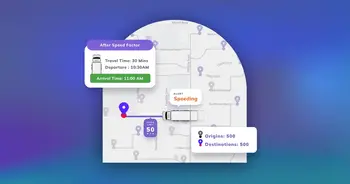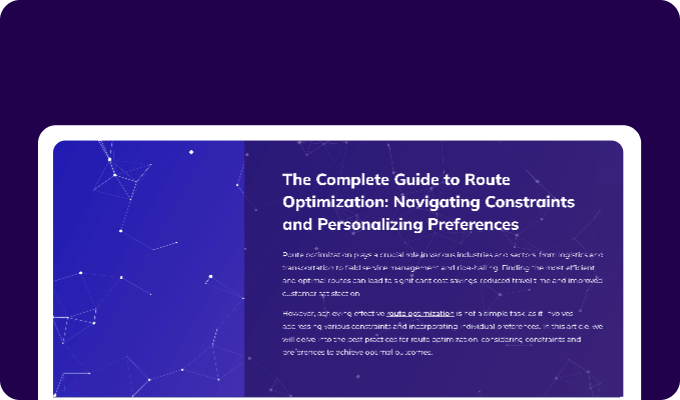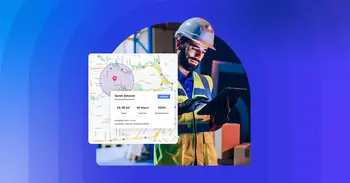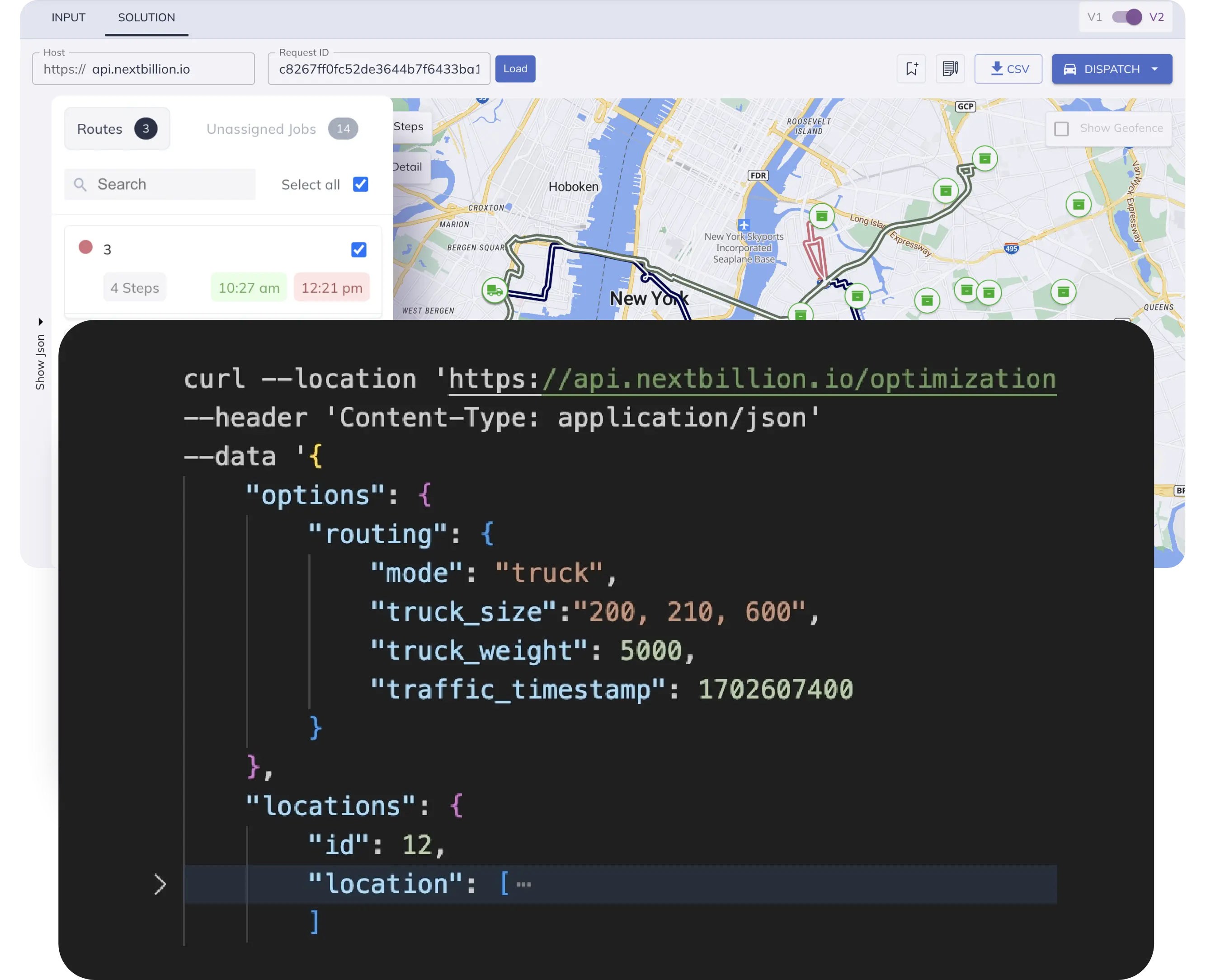Optimizing driving routes is the most popular use case of geocoding. Logistics, travel, transportation and last-mile delivery companies leverage geocoding to generate accurate ETAs and enable seamless navigation.
But geocoding, and the location intelligence derived from it, can be leveraged to power a wide range of use cases across industries.
In this article, we’ll explore mobility-driven as well as non-mobility-driven industries that use geocoding APIs to optimize their operations. But before we do that, let’s understand what geocoding is.
What is geocoding?

Simply put, geocoding assigns places to coordinates and coordinates to places. It’s a process that uses latitude and longitude coordinates to connect a location data point with a specific spot on the Earth’s surface.
Geocoding as a concept and the technology behind it have evolved over the years — from ZIP codes of the 1960s to the cloud-based geocoding APIs of the 2010s. But its main goal has remained the same throughout this transformation, i.e., to provide accurate and reliable location information to users.
In today’s location-first global economy, businesses’ reliance on precise location information to gain customer insights and enhance end-to-end supply chain visibility has increased exponentially.
Which businesses use geocoding applications?
Let’s take a look at some of the industries that utilize geocoding to streamline their business operations and how.
Logistics, supply chain and delivery

Geocoding applications for mobility-driven businesses are far and wide. Accurate location information and exact addresses help fleet managers, trucking companies, transport operators and logistics companies to improve fleet visibility and logistical efficiency.
Last-mile delivery, on-demand delivery and e-commerce companies achieve delivery accuracy, reduce returns and lower cancellation rates with real-time address verification and geocoding.
Precisely geocoded pick-up and delivery locations, and accurate POIs and information about nearby places/landmarks help on-demand delivery services meet ultra-fast delivery promises.
These business benefits compelled Indian e-commerce giant Flipkart to develop geolocation intelligence platforms for geocoding and reverse geocoding. This enabled them to tackle the problem of non-standard addresses and deliver packages to the right doorstep. Flipkart’s geocoding technology also helped them optimize warehouse operations and routes.
Travel, automotive and mobility-on-demand

Shared mobility and mobility-on-demand services such as ride hailing, ride sharing, car rentals and movers depend on geocoding to power their ETA engines and optimize pick-ups and drop-offs.
Many automotive companies are enabling accurate navigation via geocoding.
A great example of this is the automaker Jaguar Land Rover. The company has integrated geocoding technology into its cars and SUVs (new as well as used) to help drivers seamlessly navigate to any precise address across the world.
Marketing

The marketing industry has been leveraging geocoding to segment customers and improve market reach effectively for a very long time. Companies use it to identify consumer demand trends, solve location-specific retail outlet issues, devise product distribution plans, narrow down new store locations, plan advertising campaigns, trace consumer shopping patterns and track footfall in different geographies.
For example, the American food and beverage giant Pepsi ran a unique geocoded marketing campaign. The company tied up with over 40,000 retailers and street food outlets across India to offer location-specific promotional deals to its customers. After a customer shared their location information, Pepsi would then send them a location-specific list of offers, freebies and discounts.
Insurance and finance

The insurance industry and financial institutions rely on geocoding technology, along with location analytics, to validate addresses and assess risks present in certain geographies.
Take, for instance, Hiscox insurance company. The precise location of a property helps the Anglo-Burman insurance provider to run risk analysis and understand the potential risks (e.g., wildfires, hurricanes, landslides) associated with the property. These insights help Hiscox to determine its policies’ coverage options and costs for a given location.
Gaming

In the last decade, we have witnessed the rise of location-based games. You’ll find unique use cases and applications of geocoding in the gaming industry.
The magic of the very popular AR mobile game Pokémon Go lies in its geocoding element. It is this back-end feature of the game that allowed the makers to list hyper-local spots like private swimming pools, fountains, parks, football fields and churches across the world as Pokéstops and training gyms.
The game makers used geocoding to understand a geographic location and its features. And they also utilized this location technology to verify, standardize and correct addresses by comparing them against a range of address databases.
What are the benefits of NextBillion.ai’s Geocoding API?

Besides the industries mentioned above, geocoding has also made its presence felt in the healthcare, emergency services, development and social welfare sectors.
From improving incident response times to democratizing the distribution of healthcare, location intelligence generated from precise location information has helped these industries to solve complex use cases. Therefore, it’s no surprise that accurate location data is regarded as a valuable asset in the new world of business.
You can also fuel your business’ operations, empower your drivers, boost fleet efficiency and improve user experience with accurate location information produced by NextBillion.ai’s Geocoding API.
This API includes forward geocoding, reverse geocoding, discover, auto-complete and auto-suggest features. Business users can also mark custom POIs to improve route accuracy.
Here are some of the benefits of NextBillion.ai’s Geocoding API:
- Convert addresses, POIs and landmarks into accurate and precise lat-long coordinates, and vice versa
- Validate addresses and perform geospatial analyses with the help of forward geocoding
- Extract detailed contextual information about a given location with reverse geocoding
- Remove friction in the search experience with AutoComplete and help your customers quickly find the locations they’re looking for, even when the input is incorrect
- Help users discover new places and provide personalized recommendations with AutoSuggest
- Reflect custom POIs based on the insights derived from your proprietary location data
- Accurately mark rooftop POIs, including exact entry and exit points for different types of vehicles, use cases and user profiles
The benefits of maps and geospatial technology are not limited to mobility-driven businesses. Mapping technology and location intelligence can hugely benefit a vast array of businesses. Location insights play a vital role in business decisions and growth strategies.
At NextBillion.ai, we work with enterprises across sectors to improve address accuracy and delivery operations with the help of fresh map data, APIs and tools. Get in touch with us to understand how our Geocoding API can help your business.




